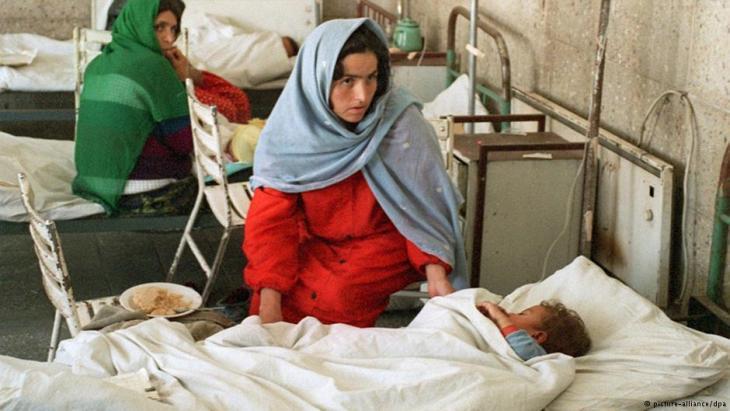 Source: Quantara.de
Source: Quantara.de
Birth control is a taboo topic in Afghanistan, the country with the highest birth rate in Asia. Many women resort to having illegal abortions in order to avoid social exclusion and to prevent undesired additions to their family. By Waslat Hasrat-Nazimi
“I swallowed medicine to abort the baby,” says Lina quietly. She doesn’t regret her decision, as she is certain that she had no other choice. “My husband was accused of taking part in a terrorist attack and was put in prison. I was already pregnant at the time,” explains the woman in her early twenties. “My family was very ashamed. ‘Now everyone is going to ask where the child came from’ is what they kept saying.”
Lina, which is not her real name, lives in a small village in eastern Afghanistan. Strict rules govern life here in this arch-conservative society. A loss of honour, even in a case such as Lina’s, is regarded as a loss of face and can be a death blow to the entire family. It is women who usually suffer the most. More than a few women resolve the conflict by having an abortion. “I know many women who have done the same,” says Lina. “You simply go to the doctor and then get the required tablets from the pharmacy. A short time later, the child is dead.”
Abortion is forbidden by law
An “induced termination of a pregnancy” is officially forbidden in the Islamic Republic of Afghanistan. Exceptions are only permitted when there is evidence that the life of the mother is in danger or that the child has a severe disability. In every other case, abortion is illegal and can result in a high fine or even imprisonment. Even rape and incest are not regarded as sufficient grounds to have an abortion, says Malika Paygham, a doctor in a hospital in the western Afghan city of Herat. “If the mother or child has heath problems, then three doctors for internal medicine and a gynaecologist conduct the abortion after consultations have taken place.” In addition, a certificate from a doctor for internal medicine and permission from the “Shura Ulama,” the religious council, must first be submitted.
Lina’s abortion was also illegal. “I know that it is murder to abort a child. But my only thought was that either I kill myself or I abort the baby.” Lina already has three children. The strict traditions of Afghan society left her with the feeling that she had no other choice. It is expected that women have many children, because, according to tradition, this ensures the survival of the family. Above all, boys are desired.
A lack of information
Afghanistan has the highest birth rate in Asia. On average, Afghan women have approximately six children over the course of their lives. Many women would prefer to have fewer children or even none at all, but they lack the necessary education to find out about the various methods of birth control. According to UNICEF, the United Nations children’s relief organisation, 79 per cent of women in Afghanistan do not use birth control. “Abortion is the only form of birth control that they know,” says Adela Mubasher from the World Health Organisation (WHO) in Afghanistan. Because it is illegal, they usually turn to traditional midwives. “This involves a great risk,” she warns. “Many of the midwives are not very well trained and cannot treat bleeding or complications that may arise.”
Others turn to private hospitals. Representatives of NGOs as well as a number of women who wish to remain anonymous claim that it is common knowledge that many of these clinics perform abortions, even without permission, for large sums of money. “It is not uncommon for young unmarried women to want to terminate an unwanted pregnancy,” admits Dr Mohammad Hashem Wahaj of the Wahaj private hospital in Kabul. “However,” he adds, “we have a license from the Ministry of Health and adhere to all the rules.” The Ministry of Health has officially confirmed that it has informed the clinics about the legal situation.
Poor healthcare
Despite great efforts, the healthcare system for women in Afghanistan has many shortcomings. Although the level of maternal mortality in the country has decreased over the past ten years, it remains one of the highest in the world. According to UNICEF, one Afghan woman dies every two hours as a result of complications during pregnancy.
“There is simply not enough qualified medical staff”, criticises Severine Caluwaerts, a gynaecologist from the organisation Doctors without Borders, who has worked in Afghanistan for a long time. “Male gynaecologists are not accepted, and there are hardly any female doctors.”
For this reason, Caluwaerts and her colleagues are focussing of educating Afghan women. “We offer women consultations on health issues and family planning, because we know that this can save their lives and that of their children.” Even Lina now knows better. She calls for a greater awareness of this social problem and wishes that “the media and the Islamic authorities in the country would talk more about the issue of family planning.”
Waslat Hasrat-Nazimi
© Deutsche Welle/Qantara.de 2014
Translated from the German by John Bergeron
Editor: Aingeal Flanagan/Qantara.de

